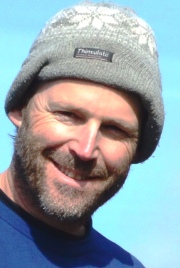Ten tips for finding a job in conservation
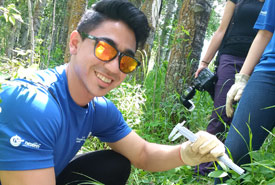
Volunteer measures tree root collar diameter with calliper. (Photo by NCC)
There’s a lot I love about my job at the Nature Conservancy of Canada (NCC). Working on endangered species, landscape planning and protecting some of Canada’s most important habitats is not a bad way to spend the day. I also like sharing our work, especially with students who are pursuing a career in conservation. Whenever I give lectures, I always get great questions from students like, “How do you measure conservation success?” or “What happens when habitat management for one rare species degrades habitat for another rare species?” But I know this is all a preamble for the question that they all have, and it inevitably gets asked: “How do I get a job in conservation?”
So, to help answer the most important question that emerging ecologists and budding biologists have, I polled some other NCC veterans about the key skills you can develop and the tips to make your resumé stand out when you’re applying for NCC’s Conservation Internship Program or other jobs in conservation.
1. The value of volunteering
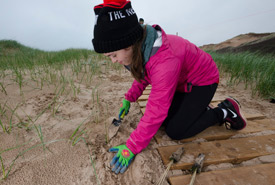
Conservation Volunteer Kali planting marram grass plugs (Photo by Sean Landsman)
Okay, this first one kind of sucks. But sometimes it helps to work for free before you work for money. Volunteering with a conservation organization can add a few lines of real-world experience to your resumé, and lets you learn more about their conservation work. It shows you are ambitious and a self-starter. It’s also a great opportunity to build your network and meet with practitioners so you can learn about their jobs. You are much more likely to get hired by employers you have met and have helped out.
2. Be good at project management
Completing a thesis or senior-year project in university or college can certainly teach some good project management skills that conservation organizations are looking for. It’s critical to demonstrate that you are effective at managing your time, meeting deadlines and dealing with multiple requests. Experience in teamwork and developing budgets is also an asset. There are many project management training programs out there. I know, you want to be an ecologist and not a project manager, but in addition to making your resumé stand out, remember that good project management skills will help you to do better conservation.
3. Your network is key

Social media networks (Illustration by Wilgengebroed, Wikimedia Commons)
Start building your professional relationships now (you can finish reading this blog first, though). Follow conservation organizations on social media to learn about their projects and culture. Social media sites such as Twitter and LinkedIn are essential for building your network, but not enough. Personal connections sparked at professional association events or conferences are better. Just like volunteering, the more people you meet, the more people that are likely to hire you.
4. Understand how the system works
To solve our current biodiversity crisis we need to make sure that good science gets integrated into supportive policies. In many cases, we already have information on species declines, habitat loss and threats to biodiversity. The challenge is to use this information to get people and decision makers to change their behaviours.
It’s important to understand the frameworks for government decision making at the federal, provincial and municipal levels, and the key role of Indigenous peoples in conservation. Learn about environmental policies and regulations, and be able to link them to your work and interests.
5. Be ready for big and emerging conservation issues
You might really be into studying the behavioural ecology of the eastern red-backed salamander or the sex organs in sticklebacks. That’s cool — the investigation skills you learn will make you a better scientist, and you might discover something wonderful. But the more you can align your studies with real-world conservation needs and issues, the more likely you are to land a job in conservation. Fortunately, there are lots of pressing research questions in conservation, such as species recovery, climate change, invasive species, restoration ecology and sustainable land and water use. Check the websites of places you want to work before you start your academic project and align it to their needs. The more you can show that you’ve been streamlining your studies towards their conservation priorities, the more likely you’ll get a job.
6. Have some field skills
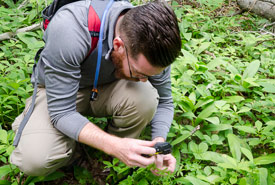
Cataloguing biodiversity on NCC properties is an important aspect of monitoring ecosystem health and alterations. Here, Mitchell MacMillan takes a photo of a plant to ID and record during an assessment on Holman's Island, PEI (Photo by Sean Landsman).
It’s so important that you know the species and habitats that you want to conserve. You may get a field course or two in university, but you’re often on your own for this. I’ve always found the best way to learn new field skills is to be in the field with people that are smarter than me. Local naturalist clubs often offer hikes where you can find those experts.
There are many new apps that can also help you identify and learn about species. Make sure iNaturalist and eBird are on your phone and that you use them. There may also be courses that will help your resumé stand out, such as rangeland health assessment, habitat restoration and ecological land classification. In addition to being able to identify species and vegetation communities, many jobs in conservation require licences and certification. These vary depending on the job, but can include chainsaw and boater safety licences, first aid and pesticide application training. The more “field ready” you are and the more initiative you show, the more likely you’ll get the job.
7. Know how to communicate your work
This can be a tough one. I followed a passion for botany because I wanted to be in the woods looking at plants, not because I wanted to wear a suit and talk to people. But being able to communicate your work and share your passion is critical to build awareness and support for conservation. Take every opportunity you can to tell people about your thesis or project. Audiences will be interested in what you do, but you will really connect with them if you tell them why you believe it’s important.
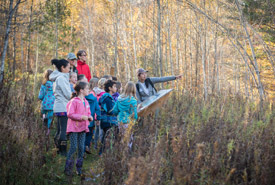
Jenna Siu leading the group at Nature Days, Happy Valley Forest (Photo by HSBC Bank Canada)
Find sites where you can post a blog, such as NCC’s Land Lines. Tweet about it. Join Toastmasters. Lead a hike. Yes, make sure you can tell it to your science colleagues, but most importantly, make sure you can tell it to your grandma. Learn to communicate clearly and without jargon. It’s not dumbing it down – it’s communicating smarter because more people will understand your message. You may think you’re getting into conservation to work with nature, but you are really working with people, and those people, including the people that are interviewing you, need to understand your work and be inspired.
8. Learn to listen, and link your work to people
You can’t be a good communicator if you aren’t a good listener. You especially need to listen to people that are outside of your regular circles. This might include farmers, business people, hunters or politicians. The more you think you disagree with them, the more you need to listen. It’s been my experience that no matter how far apart you are in opinion, there is always some shared common ground. People may not care about measuring groundwater discharge rates in wetlands or the dispersal distance of bumble bees, but they might care about drinking water and pollination. Being able to explain why conservation matters to people, local communities and the economy is becoming increasingly important.
9. Learn to fundraise
I know, I wanted to just be an ecologist too, and now I find myself doing marketing and sales. But the truth is, without funding there’s no conservation. In addition to being able to communicate what your project is, you will also need to be able to communicate why it should be funded. Now don’t worry, no intern is tasked with raising a million dollars to save endangered species; but almost all career trajectories in conservation will get you to a point where you need to help fundraise.
When applying for any job in conservation, it’s good to show that you have raised money and have reported on how it was spent. This could be a scholarship or a grant for a community project. It’s also helpful to know what some of the key funding sources are from government, foundations and corporations for conservation across Canada.
10. Don’t blow the interview
This is your big chance! You (and 10 other applicants) have been selected for an interview. You were picked out of potentially hundreds of applications because, in addition to your great education, your resumé highlighted how you’ve communicated your work, joined a local naturalist club to bolster your species identification skills and met one of the interviewers at a conference. Now you just need to show that you are ready. Share what you’ve learned and your past jobs, and link those experiences to the skills you can bring to the role. “I took a course in ornithology” is great, but “I took a course in ornithology, and got really interested in birds, and can now identify over 50 birds by ear” is better.
If you’ve been selected for an interview, it likely means that you are qualified for the job. Interviewers want you to confirm and expand upon what’s in your resumé, but also to get a sense of what you’d be like to work with. Be professional, but relax! Demonstrate how your skills make you qualified, show that you know something about the organization and ask questions, but it’s also important to show your personality and let the interviewers get to know you.
*Illustration of social media networks, Wilgengebroed (CC BY 2.0)

